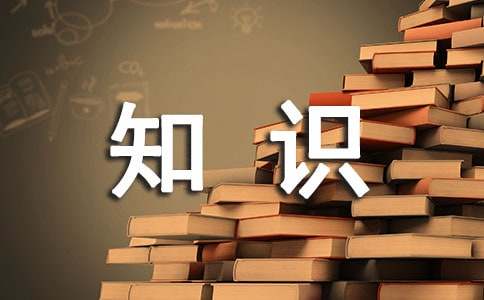小學(xué)英語(yǔ)必考的知識(shí)點(diǎn)歸納
現(xiàn)在很多小學(xué)生在學(xué)習(xí)英語(yǔ)的時(shí)候往往會(huì)疏于復(fù)習(xí),這樣很容易將學(xué)過的知識(shí)忘記,不利于成績(jī)的提高。下面是百分網(wǎng)小編為大家整理的小學(xué)英語(yǔ)必考的知識(shí)點(diǎn),希望對(duì)大家有用!

小學(xué)英語(yǔ)知識(shí)總結(jié)
一、現(xiàn)在完成進(jìn)行
現(xiàn)在完成進(jìn)行時(shí)主要用于:表示過去開始的某一動(dòng)作一直持續(xù)到現(xiàn)在,以至延伸到將來,它強(qiáng)調(diào)動(dòng)作延續(xù)時(shí)間之長(zhǎng)久。
e.g. I`ve been writing an article. 我一直在寫一篇文章。(還在寫)
cf. I`ve written an article. 我寫了一篇文章。(已寫完)
It has been raining these days. 這些天一直在下雨。
二、過去完成時(shí)
1 、過去完成時(shí)是一個(gè)相對(duì)時(shí)態(tài),表示過去的過去,只有在兩個(gè)過去發(fā)生的動(dòng)作相比較時(shí)才可顯示出來。
e.g. As soon as we got to the station, the train had left.
注:主從句表達(dá)的'動(dòng)作緊接時(shí),即兩動(dòng)作發(fā)生的時(shí)間沒有明顯時(shí)間上的懸殊或空檔時(shí),主從句都可用一般過去時(shí)。
e.g. Where did your brother study before he joined the army? 2 、過去完成時(shí)可表示截止過去某一時(shí)間動(dòng)作的總或動(dòng)作的結(jié)束。
e.g. By the end of last month. We had reviewed four books
By eight o`clock, he had finished his homework.
與這個(gè)時(shí)態(tài)連用的時(shí)間狀語(yǔ)常有:
by 1985, by eight o`clock, by then, by the end of last month, by the time when, when, as soon as, before 等連詞引導(dǎo)的時(shí)間狀語(yǔ)從句,表示主句動(dòng)作結(jié)束的時(shí)間。
小學(xué)英語(yǔ)知識(shí)要點(diǎn)
一、定冠詞不與表示一類人或事物的復(fù)數(shù)名詞連用。例如:
1. I like reading the books.(×) I like reading books.(√)
2. She likes the cats.(×) She likes cats.(√)
二、定冠詞不能用在某些習(xí)慣用語(yǔ)中的名詞前面。例如:
1. I have lunch at the noon.(×) I have lunch at noon.(√)
2. We go to school by the bus.(×) We go to school by bus.(√)
三、定冠詞不能用在某些專用名詞和不可數(shù)名詞前面。例如:
1. I like the China.(×) I like China.(√)
2. Would you like a cup of the water? (×)
Would you like a cup of water?(√)
四、定冠詞不能用在節(jié)日、日期、月份、季節(jié)前面。例如:
1. Today is the Teachers' Day. (×)
Today is Teachers' Day.(√)
2. He was born in the May in 1987. (×)
He was born in May in 1987. (√)
五、定冠詞不能用在表示稱呼語(yǔ)或某些頭銜的名詞前面(尤其作表語(yǔ)、賓補(bǔ)時(shí))。例如:
1. Good morning, the sir!(×)Good morning, sir! (√)
2. I need some help, the Mummy.(×)
I need some help, Mummy.(√)
小學(xué)英語(yǔ)知識(shí)點(diǎn)
(一)基數(shù)詞——從1數(shù)到n
1.1—12的基數(shù)詞是獨(dú)立的單詞,即: one,two,three,four,five,six,seven,eight, nine,ten,eleven,twelve。
2.13—19的基數(shù)詞以-teen結(jié)尾。如: fourteen,seventeen等,但13,15,18較特殊, 13—thirteen 15—fifteen 18—eighteen。
3.20—90的整十位均以-ty結(jié)尾。如: sixty,ninety,但20,30,40,50,80較特殊, 20—twenty, 30—thirty, 40—forty ,50—fifty ,80—eighty。
4.十位數(shù)與個(gè)位數(shù)之間要加連字符號(hào)“-”,如:28—twenty-eight,96—ninety-six。
5.百位和十位(若無(wú)十位則和個(gè)位)之間加and,如:148—one hundred and forty-eight ,406—four hundred and six。
6.hundred(百),thousand(千),million(百萬(wàn)),billion(十億)等前面即使有具體的數(shù)詞,也不能在它們的后面加s。如:600—six hundred,8百萬(wàn)—eight million。
7.1000以上的數(shù)字,從后往前數(shù)每三位加一個(gè)逗號(hào)“,”第一個(gè)逗號(hào)前為千(thousand),第二個(gè)逗號(hào)前為百萬(wàn)(million),第三個(gè)逗號(hào)前為billion(十億)。英語(yǔ)中無(wú)“萬(wàn)”這個(gè)詞,我們可以用“幾十個(gè)千(thousand)”表示幾萬(wàn),“幾百個(gè)千(thousand)”表示“幾十萬(wàn)”。如:2,510=two thousand five hundred and ten;84,296=eighty-four thousand two hundred and ninety-six;
【小學(xué)英語(yǔ)必考的知識(shí)點(diǎn)歸納】相關(guān)文章:
中考英語(yǔ)必考的知識(shí)點(diǎn)歸納12-04
小考英語(yǔ)必考的重要知識(shí)點(diǎn)歸納06-10
小考必考英語(yǔ)知識(shí)點(diǎn)歸納通用版06-10
小考必考的英語(yǔ)知識(shí)點(diǎn)歸納精華版06-10
高考化學(xué)必考知識(shí)點(diǎn)歸納11-18